Private markets are solidifying their position as the global growth engine, with Preqin projecting their value will reach a towering $30T by 2030. In turn, demand for private market data is accelerating rapidly around the world.
But high-quality private market data is notoriously hard to find. The limited information that’s available tends to be fragmented, leaving dealmakers to piece together partial views from numerous disparate tools.
The results? Clunky workflows, market blind spots, and missed opportunities.
For dealmakers trying to operate in international markets, these challenges are amplified by different reporting requirements and systems, currency conversions, and translations.
But what if dealmakers in Europe and Australia could navigate the private market with confidence and ease? And what if instead of being a hinderance, data complexity was a competitive advantage?
We’re working with our partners at Datasite to make that vision a reality and bringing full visibility to private markets in the UK, France, Germany, and Australia.
The Private Market Data Challenge in Europe and APAC
To make investment decisions with confidence, dealmakers need to see the full picture of their space. That means they need high-quality private market data.
The issue is that the reporting requirements aren’t standardized across countries — or even across companies.
The UK
In the UK, privately owned companies that meet certain size criteria are required to file annual financial statements with Companies House. But a significant number of firms don’t meet those criteria, which still leaves investors with a blind spot. Companies meeting two of the following “small company” criteria are required to file less information than their larger counterparts:
- An annual turnover of no more than £15M
- A balance sheet total of no more than £7.5M
- No more than 50 employees on average
France
Countries across the EU use different business registry systems. In France, the Insitut National de la Satistique et de Études Économiques (INSEE) manages the country’s national business register. Most companies must also file annual financial statements with the Commercial and Companies Registry (RCS). Companies that meet two of the following criteria qualify as “small companies” and can prepare abridged balance sheets and income statements:
- Total balance sheet less than or equal to 7.5M €
- Net turnover less than or equal to 15M €
- Average number of employees less than or equal to 50
Even medium-sized companies (total balance sheet ≤ 25M €, net turnover 50M €, average number of employees ≤250) can request that their income statements not be made public.
Germany
In Germany, all companies that are registered with the country’s Unternehmensregister (Company Register) file annual financial statements — but the specific documents depend on each company’s size and structure.
- Micro companies (balance sheet total ≤350,000 €, net revenue ≤700,000 €, and/or average number of employees ≤10) are exempt from filing profit and loss statements
- Small companies (balance sheet total ≤ 6M €, net revenue ≤12M €, and/or average number of employees ≤50) can file abridged balance sheets and notes. They are also not required to file profit and loss statements.
Australia
Australia’s middle market is vibrant, but opaque. Private companies have specific financial reporting requirements depending on if the company is classified as small or large. To be considered as a small company, a business must meet two of three thresholds:
- Consolidated revenue of less than $50M
- Consolidated gross assets of under $25M
- Fewer than 100 employees at the end of the financial year
Companies that meet these criteria have more comprehensive reporting requirements than small companies.
Where Does That Leave the Dealmaker?
So to recap, private market dealmakers:
- Don’t have comprehensive coverage of their markets because small companies have limited reporting requirements
- Don’t have data points beyond what’s shown in the filings, which is often limited to financials
- Have to rely on filings for information, even though that information could be misleading or incomplete because they don’t account for subsidiaries or foreign headquarters
Operating from incomplete analysis leads to inefficient workflows, which costs dealmakers time, resources, and opportunity. If a target company meets the reporting thresholds, dealmakers have to parse through registry documents. If the target doesn’t meet the thresholds, dealmakers have to estimate themselves using proxies like headcount — which have their own challenges.
The Solution: Full Visibility into Private Markets
Grata’s top priority has always been providing dealmakers with full market visibility. That doesn’t just mean having more company profiles — it means having the right dimensions of data and seamless workflows all in one place.
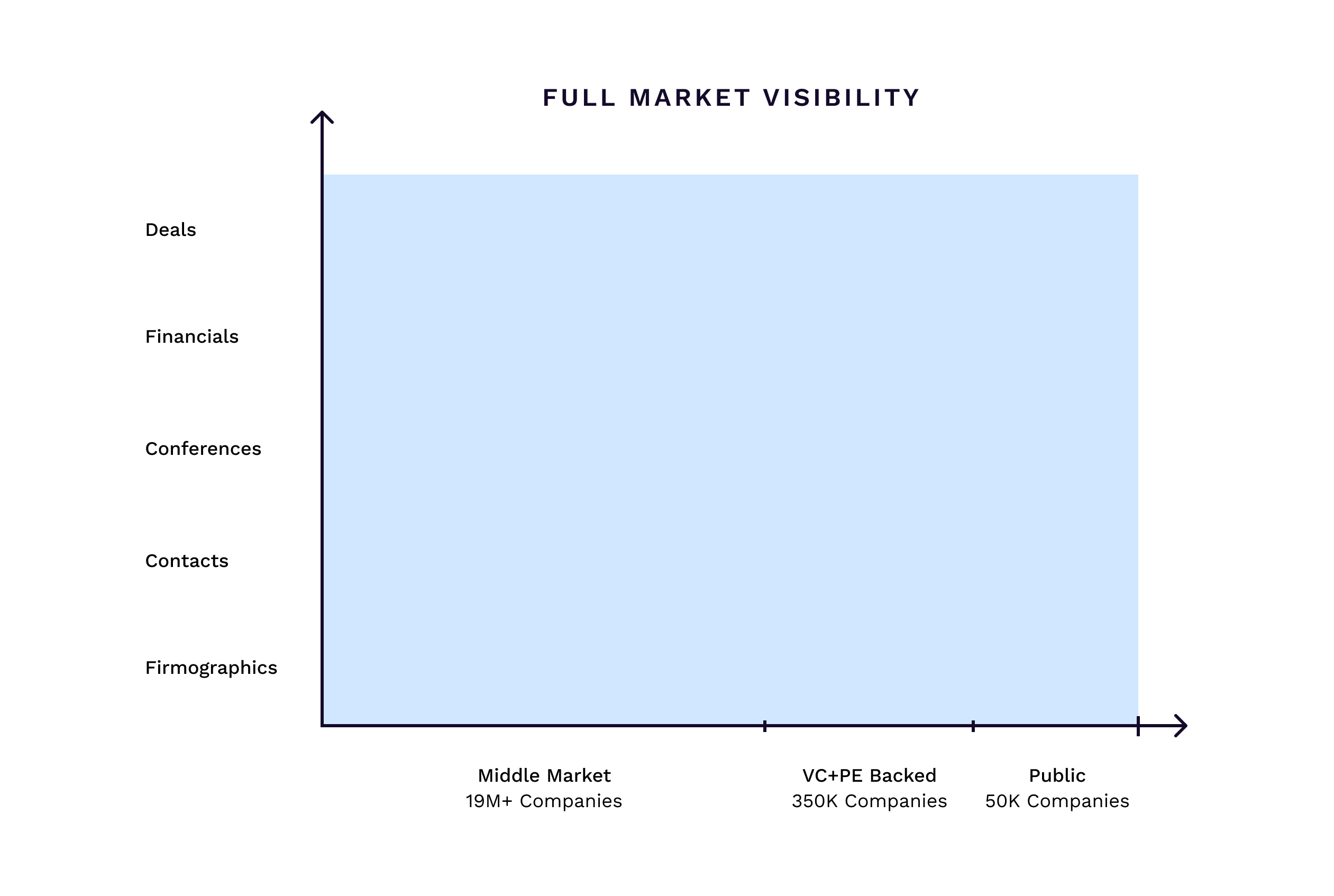
So how do we do it?
Coverage
Grata doesn’t just look at big-name public companies, or companies that have raised VC funding, or companies that have been acquired, or companies that meet registration thresholds. Those are just the tip of the iceberg.
We aggregate all of these — and we canvas the entire digital universe to surface all investable companies to private market dealmakers.
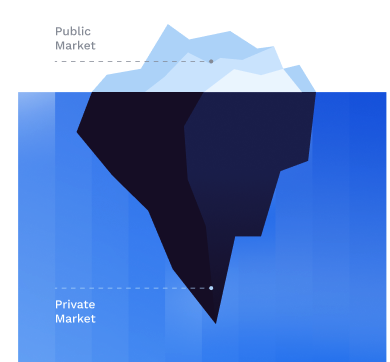
With Grata, you always get high quality, comprehensive coverage of your entire market so you can make the smartest decisions for your business.
Data Dimensions
Lack of visibility leads to inefficient workflows, which cost dealmakers time and money. They need a cohesive, data-driven picture of their market to build a strong pipeline and make smart decisions.
The most important data dimensions for private market dealmaking are:
- Firmographics. Dealmakers need comprehensive company descriptions, precise industry classifications, and accurate employee estimates.
- Contacts. Dealmakers must be able to reach out to the right people at their target companies to get the ball rolling. They need verified contact information to make that happen.
- Conferences. Dealmakers need to stay up to date on conferences, events, and trade shows in their industries. This is crucial for sourcing, networking, and keeping up with industry trends. If they’re able to see lists of companies in attendance, that’s even better — they can set up meetings before the event to make the most of their time.
- Financials. Dealmakers have to understand how their target companies are performing and how they stack up against the broader market.
- Deals. Dealmakers need clear insight into the deals happening in their target industries to understand overall trends and price their deals with confidence. Access to verified live deals can also add a tremendous competitive advantage, as dealmakers can reach their targets faster than their competitors — and sometimes before they even go to market.
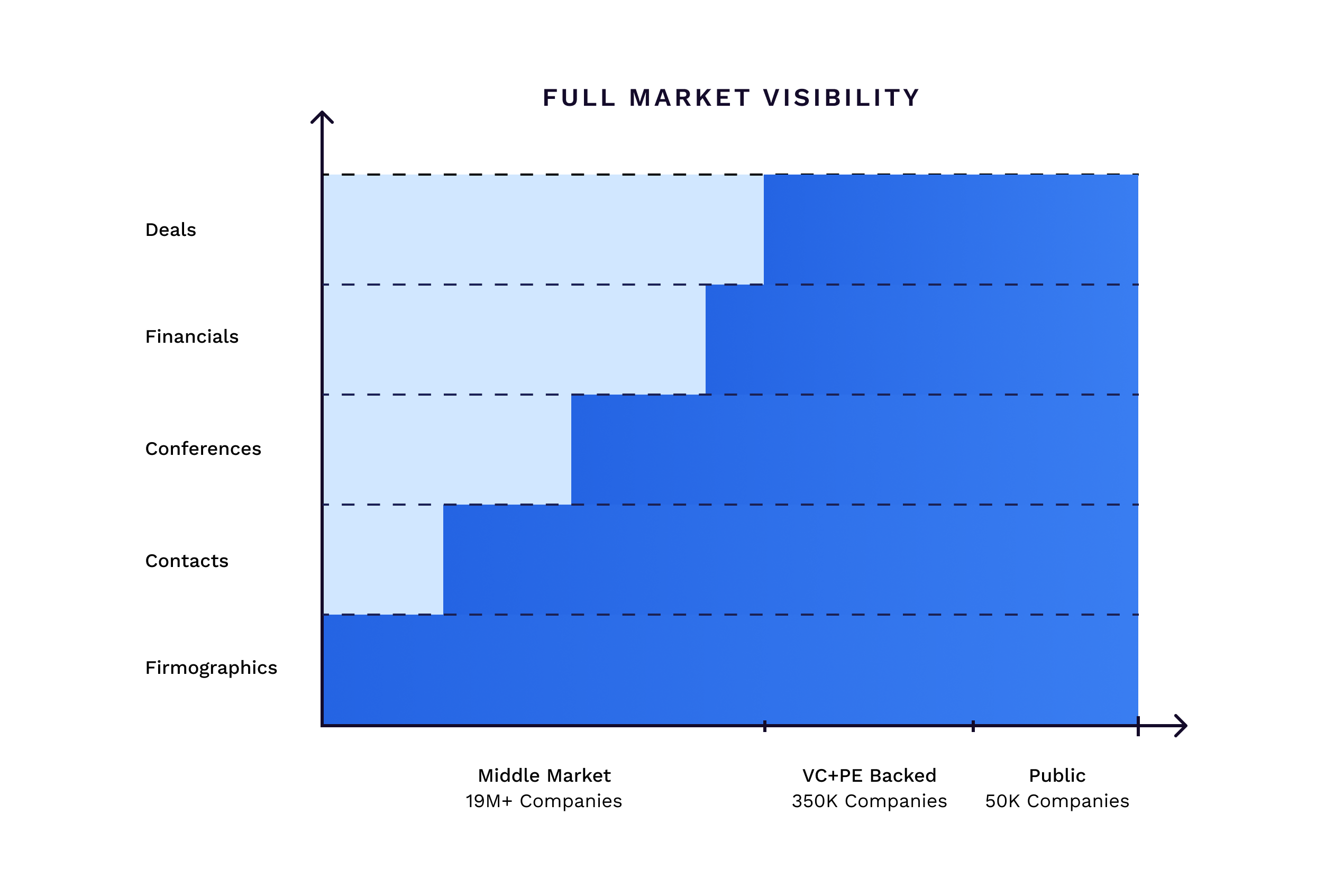
With Grata, dealmakers can access all of these data dimensions directly on company profiles.
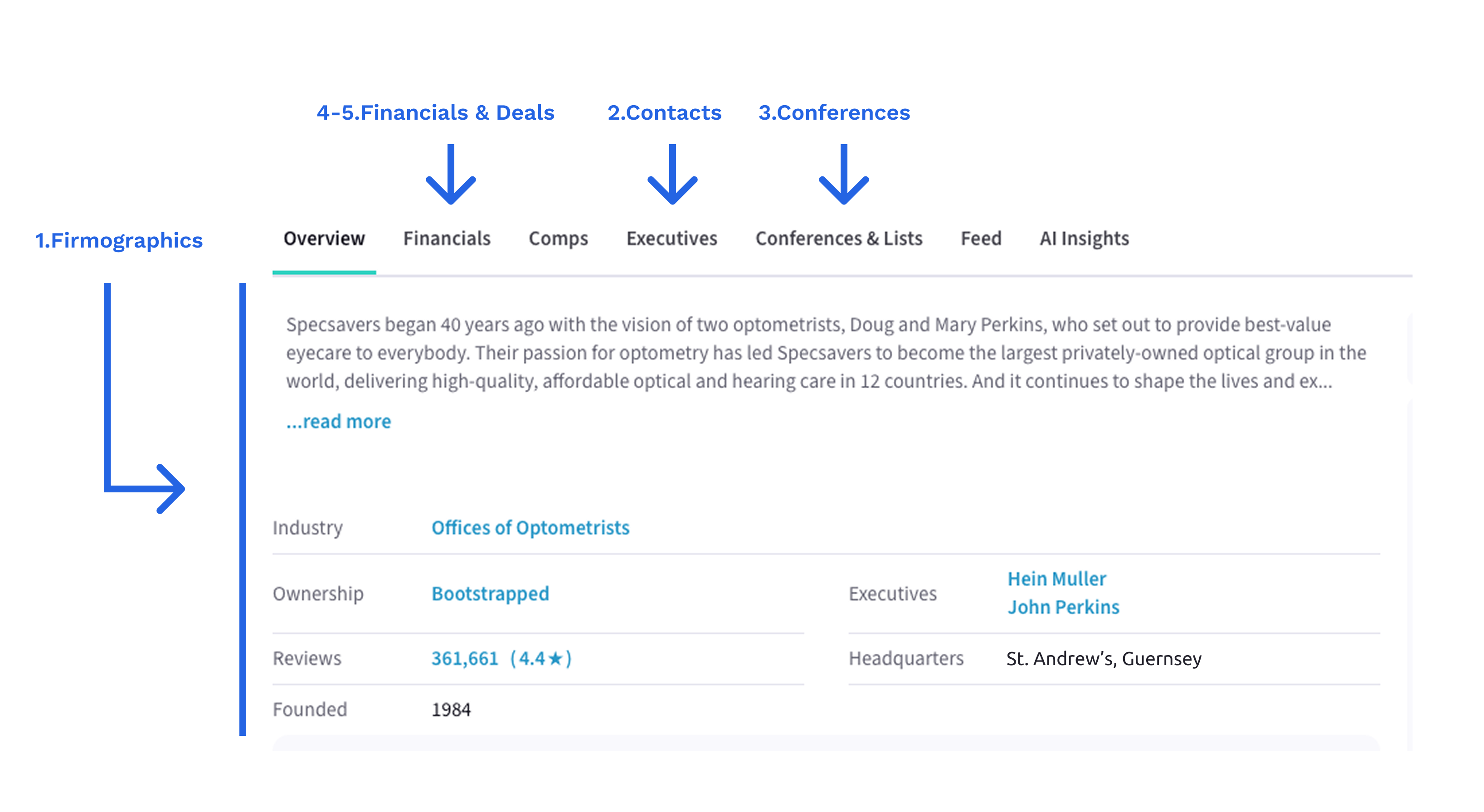
Where the Data Comes From
Grata’s AI reads and synthesizes public and proprietary sources just like a human analyst would to provide investment-grade data. The process is broken down into three layers.
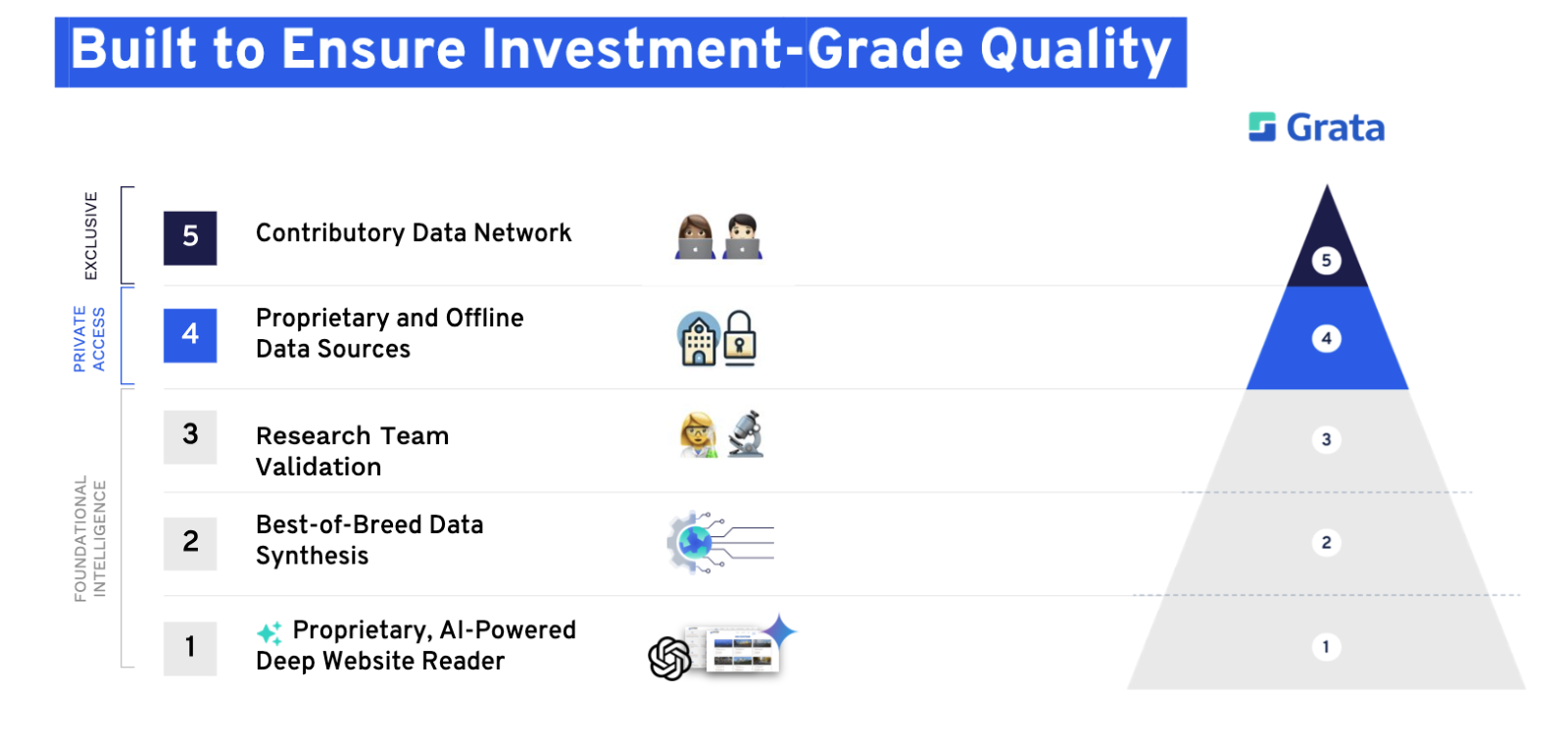
Foundational Intelligence
The first layer is Foundational Intelligence, Grata’s proprietary synthesis. This is where we combine public data with purpose-built, verticalized AI and validation from our best-in-class research team.
Grata's suite of AI agents read millions of company websites in the same analytical way that an M&A professional would. Because our AI is backed by deep in-house human expertise and exclusive training data, it’s able to analyze frequency, patterns, navigation flows, word combinations, and conceptual signals.
All of this is synthesized with expert research and consistently verified by our data scientists to provide proprietary and opinionated perspectives on which data is accurate. The result is comprehensive, precise coverage across:
- Industry classification
- Similar companies
- Employee count
- Growth
- Ownership
- Funding
- Reviews
Private Access
The next layer is Private Access. The data we capture here would be extremely difficult for dealmakers to find on their own, because it comes from non-public sources, such as web pages that are not indexed and materials hidden behind registrations.
Grata’s AI agents comb through proprietary and offline sources to aggregate data that dealmakers need to make decisions, including:
- Private company financials
- Valuations and deal dynamics
- Executive contact information
- Trade show conference exhibitor lists
In cases where precise data doesn’t exist in any single source — like estimated revenue, industry classification, or business model — our AI agents generate it through inference, triangulation, and validation from our data scientists.
Because our AI engine is constantly running, it synthesizes the most current sources to ensure accuracy.
Exclusive Data
The final layer is Exclusive Data. This is data dealmakers can’t find anywhere else because it comes from our exclusive contributory network, the Grata Deal Network.
Vetted sell-side advisors share their active mandates with the Grata team. We then vet the deals to ensure the financials meet our investment-grade standards. Once they pass the test, we share deal teasers on the Grata platform so that our network of highly qualified buyers can find them.
This is a huge competitive edge for dealmakers. Not only does it give them access to deals before they hit the market, but it also gives them an extra “in” to the middle market. Where platforms like Axial and BizBuySell cater to small business acquisitions, the Grata Deal Network is specifically built for the middle market.
Consolidated Financials
Our latest product update allows dealmakers in the UK, France, and Germany to dive deep into the Financials data dimension without leaving the Grata platform.
Typically, private market investors in these countries would need to sift through government documents across multiple sources to get a solid picture of a target’s financial performance, subsidiaries, etc. Grata consolidates everything directly on the company’s profile.
Dealmakers in the UK, France, and Germany can now see up to five years of financial filings — including revenue, earnings, and equity — on the company’s Financials tab. They can even see the source documents from Companies House, INSEE, and Handelsregister.
For example, here is the financial data that a dealmaker could see for Datasite:
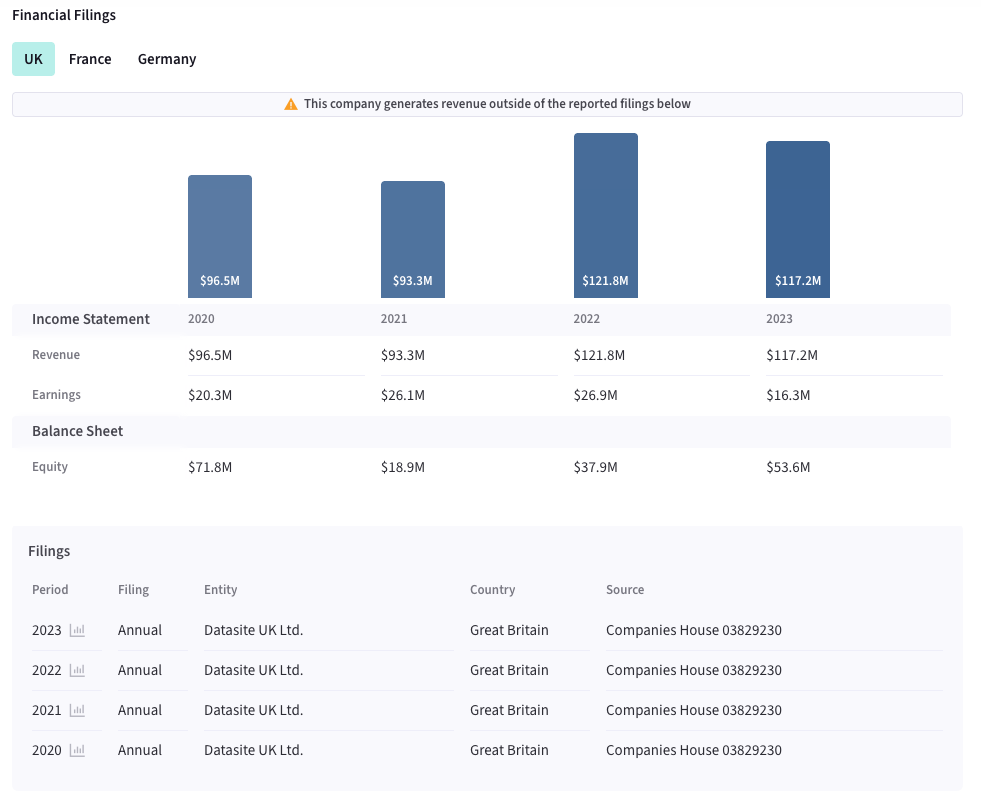
Financial filings documents on Grata also aggregate multiple subsidiaries within and across countries. No need to map these companies yourself — we do it for you. Currencies are also standardized across the filings for ease.
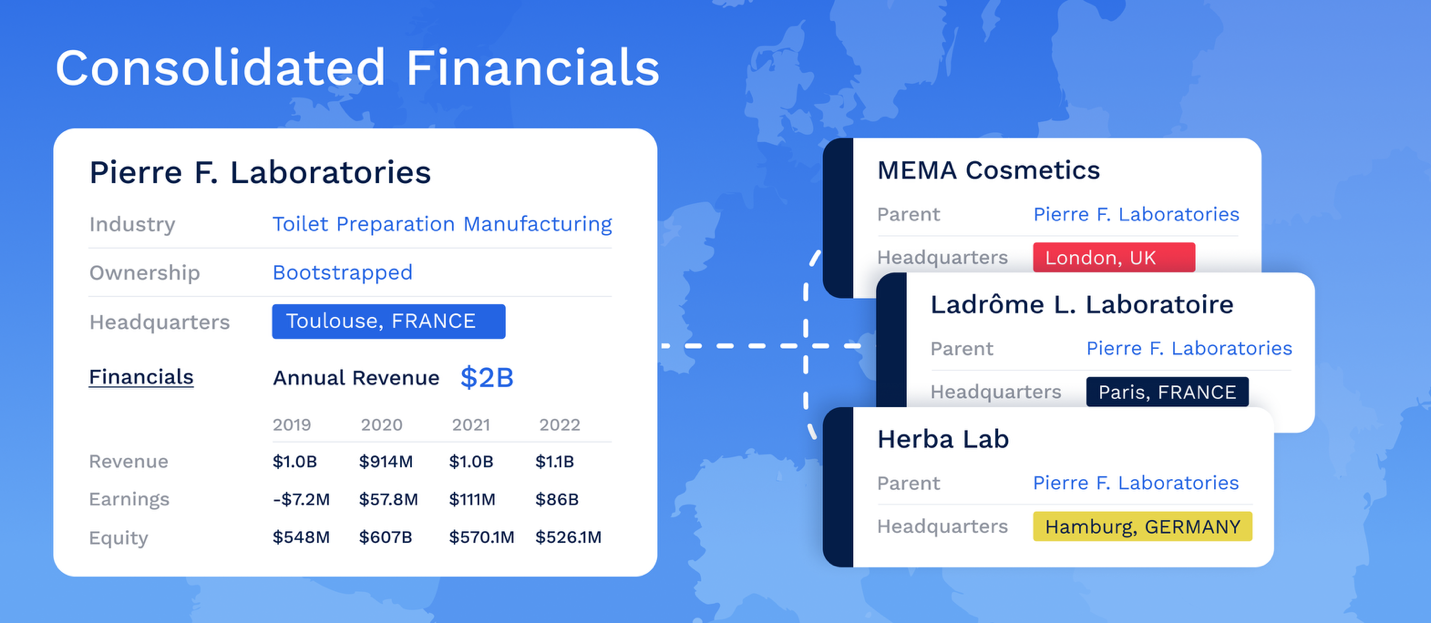
Companies and financial data shown in the image above have been generated for illustrative purposes.
This way, dealmakers can easily access all of the data they need to screen potential targets is in one place.
Comprehensive Workflows
Accessibility is just as important as depth. Private market investors have to be able to seamlessly integrate the data into their processes. Grata's AI-powered workflows surface the data you need quickly and all in one place at every step of the dealmaking process.
- Industry research – Understanding market landscapes takes time — and a lot of data. Analyze competitive landscapes, assess fragmentation, and detect M&A activity quickly and efficiently. Discover more companies in your space vetted and ranked by trusted publishers with List Library.
- Sourcing – Finding the right targets means going beyond surface-level searches. Grata’s deeper search capabilities and Similar Company search reveal adjacent markets and lesser-known opportunities. The Grata Deal Network connects dealmakers with live mandates, giving users exclusive access to in-market deals.
- Comps analysis – Finding precise comps is difficult. Whether you are working from a list of companies, or a strategic focus, flexible filters and deep data ensure your comps reflect the reality of your deal. Define your market using specific industries, companies, or lists. See the most accurate comps for your target.
- Trip planning – Travel is only valuable if it drives relationships. Find conferences, trade shows, and events that matter most in your industry. Search within attendee lists to find your highest priority targets. Reach out to executives with verified contact information to set up meetings ahead of time.
- Pipeline management – Managing a pipeline requires structure and adaptability. Create custom labels, that match your deal process. Document your interactions with Notes and collaborate with your team. In Grata every step is visible, searchable and aligned to your internal workflow – reducing friction and improving handoff.
- Relationship tracking – Relationships can live in many places. Use Grata’s bi-directional CRM integration to see your most important Salesforce, Dealcloud, or Hubspot data directly in the Grata platform. Prioritize the right opportunities and streamline your processes.
- Buyer list building – When it’s time to exit, identifying the right buyers is critical. Grata’s extensive breath of data and purpose-built filters allow users to search across 20,000 financial sponsors and 100,000 strategic buyers based on investment criteria and past deals. Build buyer lists and run exit analyses rooted in data not guesswork
Partnership with Datasite
As a Datasite company, Grata is now a global player. We have a significant footprint in the EMEA region and beyond, with 500+ employees in Europe alone. We also have team members on the ground in:
- London
- Paris
- Frankfurt
- Sydney
Our colleagues in these offices verify local data and trends so you can make decisions with confidence.
Datasite’s workforce is global, with 1,500+ employees across six continents. We’re excited to continue working with them to bring full market visibility to even more markets in the future.
Grata & Datasite: Smarter Together
Grata and Datasite are redefining how dealmakers navigate — and win in — the private market.
Grata’s exclusive, investment-grade data and proprietary AI, combined with Datasite’s global footprint, infrastructure, and deep expertise in M&A workflows, create unprecedented value for users.
Our ongoing investment in innovation and international expansion is a direct result of our commitment to providing an end-to-end private market platform. This latest update helps more dealmakers navigate the increasingly complex M&A landscape confidently and efficiently.
We’re excited to continue learning from our partners on the ground in the UK, France, Germany, and Australia, and to expand further in the future. Stay tuned!
In the meantime, if you’re ready to unlock the private market, request a demo to get started.




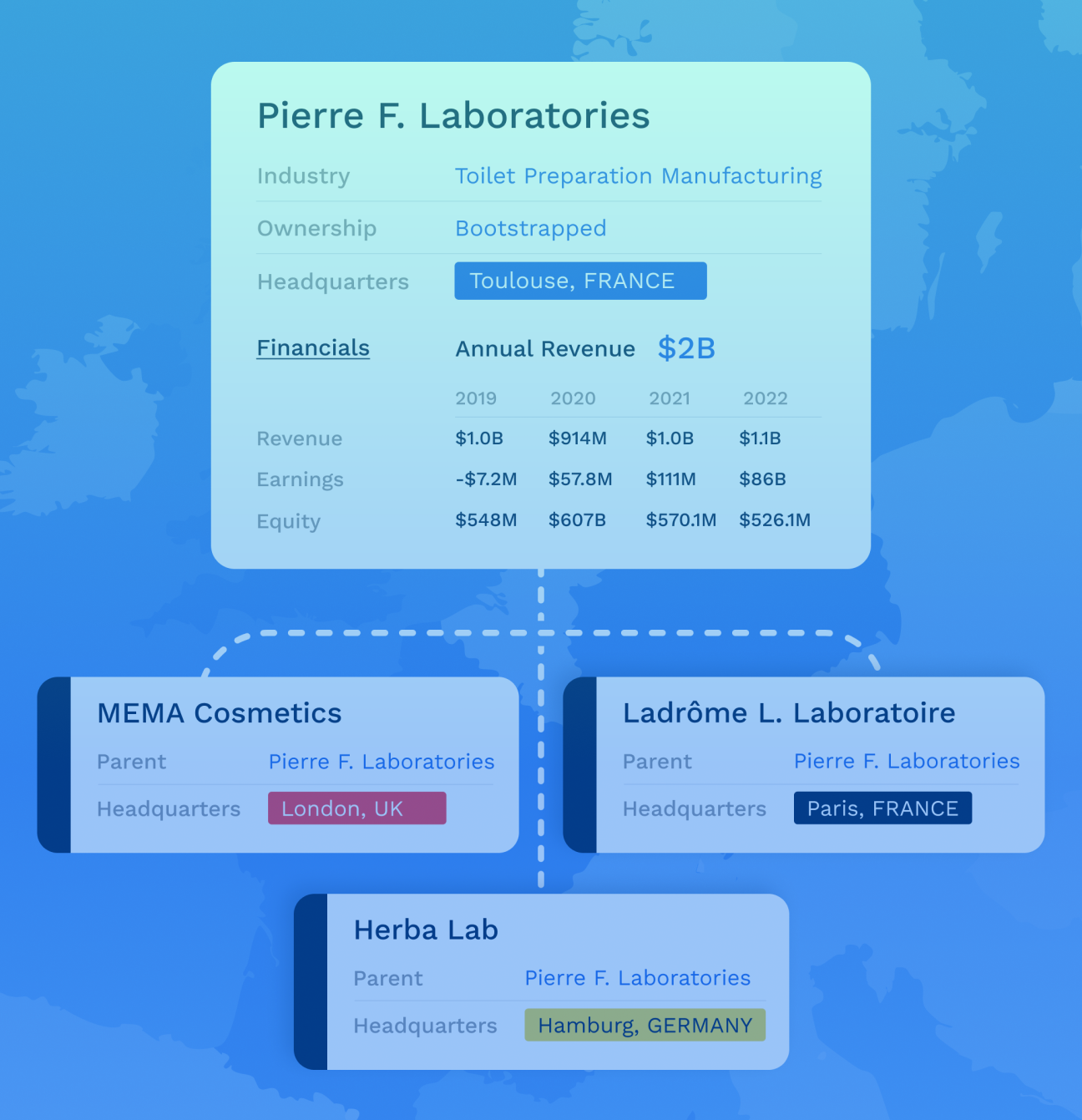







.png)
